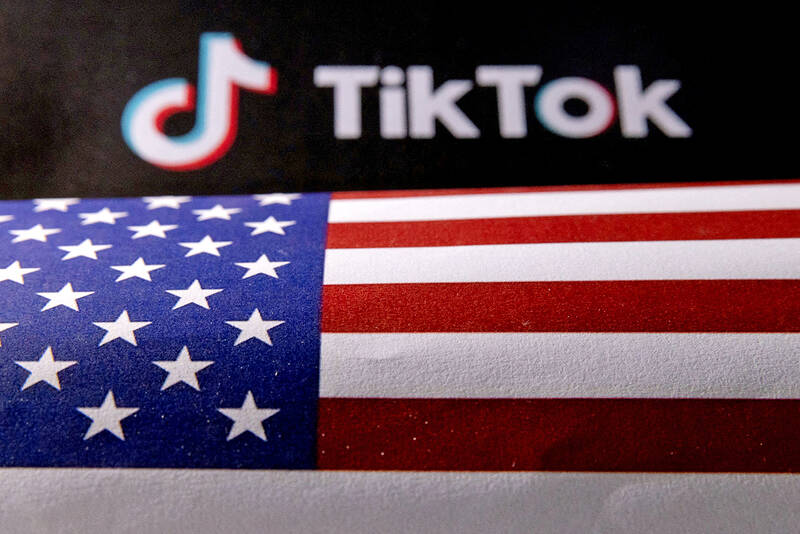The U.S. House of Representatives overwhelmingly passed a bill on Wednesday that would give TikTok’s Chinese owner ByteDance about six months to divest the U.S. assets of the short-video app used by about 170 million Americans or face a ban.
The bill passed 352-65, with bipartisan support, but it faces a more uncertain path in the Senate where some favor a different approach to regulating foreign-owned apps that could pose security concerns. Democratic Senate Majority Leader Chuck Schumer has not indicated how he plans to proceed.
TikTok’s fate has become a major issue in Washington. Democratic and Republican lawmakers said their offices had received large volumes of calls from teenaged TikTok users who oppose the legislation, with the volume of complaints at times exceeding the number of calls seeking a ceasefire between Israel and Hamas in Gaza.

Photo: REUTERS
The measure is also the latest in a series of moves in Washington to respond to U.S. national security concerns about China, from connected vehicles to advanced artificial intelligence chips to cranes at U.S. ports.
The vote comes just over a week since the bill was proposed following one public hearing with little debate, and after action in Congress had stalled for more than a year. Last month, President Joe Biden’s re-election campaign joined TikTok, raising hopes among TikTok officials that legislation was unlikely this year.
The House Energy and Commerce Committee last week voted 50-0 in favor of the bill, setting it up for a vote before the full House.
TikTok CEO Shou Zi Chew will visit Capitol Hill on Wednesday on a previously scheduled trip to talk to senators, a source briefed on the matter said.
“This legislation has a predetermined outcome: a total ban of TikTok in the United States,” the company said before the vote. “The government is attempting to strip 170 million Americans of their Constitutional right to free expression,” it added.
Biden said last week that he would sign the bill.
White House national security adviser Jake Sullivan said on Tuesday the goal was ending Chinese ownership, not banning TikTok.
“Do we want TikTok, as a platform, to be owned by an American company or owned by China? Do we want the data from TikTok - children’s data, adults’ data - to be going, to be staying here in America or going to China?” he said.
It is unclear whether China would approve any sale or if TikTok’s U.S. assets could be divested in six months.
If ByteDance failed to do so, app stores operated by Apple , Alphabet’s Google and others could not legally offer TikTok or provide web hosting services to ByteDance-controlled applications.
In 2020, then-President Donald Trump sought to ban TikTok and Chinese-owned WeChat but was blocked by the courts. In recent days he had raised concerns about a ban. It remains unclear if Tencent’s WeChat or other high-profile Chinese-owned apps could face a ban under the legislation.
Any forced TikTok divestment from the U.S. would almost certainly face legal challenges, which the company would need to file within 165 days of the bill being signed by the president. In November, a U.S. judge blocked a Montana state ban on TikTok use after the company sued.

CHAOS: Iranians took to the streets playing celebratory music after reports of Khamenei’s death on Saturday, while mourners also gathered in Tehran yesterday Iranian Supreme Leader Ayatollah Ali Khamenei was killed in a major attack on Iran launched by Israel and the US, throwing the future of the Islamic republic into doubt and raising the risk of regional instability. Iranian state television and the state-run IRNA news agency announced the 86-year-old’s death early yesterday. US President Donald Trump said it gave Iranians their “greatest chance” to “take back” their country. The announcements came after a joint US and Israeli aerial bombardment that targeted Iranian military and governmental sites. Trump said the “heavy and pinpoint bombing” would continue through the week or as long

TRUST: The KMT said it respected the US’ timing and considerations, and hoped it would continue to honor its commitments to helping Taiwan bolster its defenses and deterrence US President Donald Trump is delaying a multibillion-dollar arms sale to Taiwan to ensure his visit to Beijing is successful, a New York Times report said. The weapons sales package has stalled in the US Department of State, the report said, citing US officials it did not identify. The White House has told agencies not to push forward ahead of Trump’s meeting with Chinese President Xi Jinping (習近平), it said. The two last month held a phone call to discuss trade and geopolitical flashpoints ahead of the summit. Xi raised the Taiwan issue and urged the US to handle arms sales to

State-run CPC Corp, Taiwan (CPC, 台灣中油) yesterday said that it had confirmed on Saturday night with its liquefied natural gas (LNG) and crude oil suppliers that shipments are proceeding as scheduled and that domestic supplies remain unaffected. The CPC yesterday announced the gasoline and diesel prices will rise by NT$0.2 and NT$0.4 per liter, respectively, starting Monday, citing Middle East tensions and blizzards in the eastern United States. CPC also iterated it has been reducing the proportion of crude oil imports from the Middle East and diversifying its supply sources in the past few years in response to geopolitical risks, expanding

An Emirates flight from Dubai arrived at Taiwan Taoyuan International Airport yesterday afternoon, the first service of the airline since the US and Israel launched strikes against Iran on Saturday. Flight EK366 took off from the United Arab Emirates (UAE) at 3:51am yesterday and landed at 4:02pm before taxiing to the airport’s D6 gate at Terminal 2 at 4:08pm, data from the airport and FlightAware, a global flight tracking site, showed. Of the 501 passengers on the flight, 275 were Taiwanese, including 96 group tour travelers, the data showed. Tourism Administration Deputy Director-General Huang He-ting (黃荷婷) greeted Taiwanese passengers at the airport and